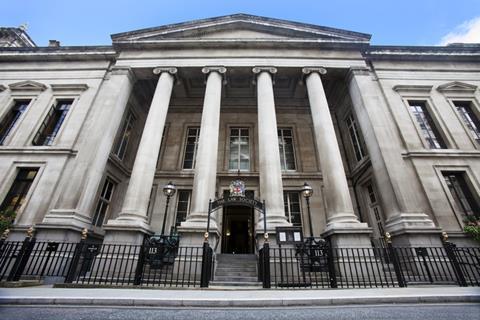Criminal defence lawyers face ‘a make or break year’, the Law Society said today, warning that the government’s proposed investment in criminal legal aid is ‘woefully inadequate’.
Chancery Lane said the £135m pledged by the Ministry of Justice does not properly reflect the recommendations made by Sir Christopher Bellamy QC, who led a government-commissioned review into criminal legal aid.
Bellamy, who was today appointed as a justice minister, called for an increase in funding of ‘at least 15% above present levels’ – which he estimated would cost an extra £135m a year – as ‘the minimum necessary as the first step in nursing the system of criminal legal aid back to health’.
However, the Law Society – which initially welcomed the MoJ proposals, before withdrawing its support in March – said the government has ‘deviated from Sir Christopher’s recommendations in two crucial respects in order to make the claim that they have invested £135m’, which it says amounts to an ‘actual increase for solicitors overall’ of just 9%.
The MoJ has based its calculations on projected volumes in 2024-25 and included £17m ‘for the Public Defender Service, for experts and for training grants’, the Law Society said, none of which relates to Bellamy’s ‘primary objective of making this work economically viable for solicitors’.
In its response to the government’s consultation on criminal legal aid, Chancery Lane said: ‘The package falls short both by the use of future volume figures and by the fact that a significant part of the money is not going to increased rates at all.’

The Law Society noted that Bellamy had estimated the cost of a 15% increase in remuneration for both solicitors and barristers at £135m, adding: ‘Based on 2019-20 volumes of cases, he estimated this would cost £135m, £100m for solicitors and £35m for barristers.
‘It is therefore not correct to say that Sir Christopher recommended investment of £135m. He recommended an across the board percentage uplift. £135m was the estimated cost, not a recommendation in its own right.’
It added that the ‘substantial increase in inflation’ since Bellamy’s report was published in December ‘means that the real value of the proposals on offer would already be significantly less than Sir Christopher intended even if solicitors were being offered the 15% he said is needed’.
The ongoing dispute over criminal legal aid remuneration has seen hundreds of barristers adopt a policy of ‘no returns’ following an overwhelming vote in favour, with Law Society president I. Stephanie Boyce previously saying: ‘We understand why barristers have chosen to take this action.’
The Criminal Bar Association is currently consulting its members about further action while members of the London Criminal Courts Solicitors Association have also indicated a desire for tougher action and demanded a 25% uplift in fees.
In its consultation response, the Law Society also warned about problems with recruitment, noting that 81% of those responding to its recent flash poll said they do not see criminal defence as a viable long-term career, and the sharp decline in the number of firms undertaking criminal legal aid work.
Boyce said: ‘The government’s proposed funding is not enough to maintain a criminal defence profession to uphold justice. Our criminal justice system is in crisis. There has been no meaningful increase in criminal legal aid rates of pay in 25 years. Legal aid rates have instead been cut, while also being eroded by inflation.
‘Without serious and committed intervention, the viability of our criminal justice system is at risk. Access to legal representation – which is essential to ensure people’s rights are respected, trials are fair, and miscarriages of justice are prevented – will no longer be assured.’
She added that Bellamy’s review ‘recommended a 15% increase in remuneration for solicitors as a bare minimum to keep the wheels of justice turning, but the government proposals amount to just 9%, which is woefully inadequate’.
An MoJ spokesperson said: ‘While we continue to monitor the impact of inflation, we will consider the report’s findings alongside responses to our consultation.’



























3 Readers' comments